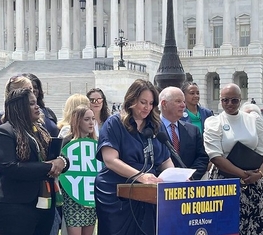Hecox v. Little
Case Summary
The League of Women Voters of the US filed an amicus brief in support of plaintiffs in Hecox v. Little on appeal at the Ninth Circuit. The case challenges Idaho’s Fairness in Women’s Sports Act, which targets transgender, nonbinary, and intersex students with the nation’s harshest requirements for participation in women’s sports.
Hecox v. Little is a challenge to the Idaho Fairness in Women’s Sports Act, which prohibits transgender women and girls, intersex persons, and any nonbinary person from participating in sports.
The law has three important parts. First, the law requires that all sports are designated male, female, or coed. Members of the male sex are not allowed to participate in female sports, but there is not a comparable limitation on transgender or cisgender person who wants to participate in male sports. Second, the school or institution is permitted to settle a dispute regarding a student’s sex by requiring that the student obtain a consent form signed by a qualified healthcare provider that verifies the student’s biological sex. This doctor’s verification must be based on a health examination that relies on “the student’s reproductive anatomy, genetic makeup, or endogenously produced testosterone.” Lastly, the law creates an enforcement mechanism by creating a private right of action for any student negatively impacted by a violation of the Act.
This type of categorical ban on transgender women’s and girls’ and nonbinary and intersex persons’ participation in sports would be the first of its kind on a national scale. While some other states require medical examinations, none are as invasive as the law in Idaho. Even under the current NCAA and Idaho High School Activities Association (“IHSAA”) rules, a transgender girl or woman is permitted to compete in women’s sports following one year of hormone therapy suppressing testosterone for the purposes of gender transition.
On April 25, 2020, plaintiffs Lindsay Hecox, a transgender woman attending Boise State University and Jane Doe, a high school student, filed a lawsuit in the United States District Court of Idaho challenging the law. The plaintiffs asserted that the ban violated the Fourteenth Amendment’s Equal Protection and Due Process Clauses, as well as the Fourth Amendment’s privacy protections.
On August 17, 2020, the District Court granted the plaintiffs’ motion for a preliminary injunction, ruling the plaintiffs were likely to succeed in proving the law was unconstitutional on the merits.
The defendants appealed to the Ninth Circuit Court of Appeals. LWVUS filed an amicus brief in support of the plaintiffs. The amicus brief highlights the history of harm that gender testing has caused.
On June 24, 2021, the Ninth Circuit remanded the case to the District Court to determine whether the plaintiff Lindsey Hecox still had standing to participate in the case.
The League was represented by the National Women’s Law Center, Hogan Lovells US LLP, and the Lawyers’ Committee for Civil Rights Under Law.
LWV Timeline
Complaint filed in district court
Plaintiffs file a lawsuit in federal court challenging the state’s Fairness in Women’s Sports Act.
District court grants preliminary injunction
The District Court grants plaintiffs' motion for a preliminary injunction, blocking the Idaho Fairness in Women’s Sports Act pending trial on the merits.
Defendants appeal to the circuit court of appeals
The defendants appealed the case to the Ninth Circuit Court of Appeals.
LWVUS files amicus brief supporting plaintiffs
The League of Women Voters of the United States joins an amicus brief led by the National Women’s Law Center and the Lawyers’ Committee for Civil Rights in support of the plaintiffs.
Ninth circuit remands case
US Court of Appeals for the Ninth Circuit remands the case back to the District Court on the limited question of whether Ms. Hecox’s claim is moot in light of her enrollment status at Boise State University.
District court rules case is not moot
The District court rules that the Lindsey Hecox's claim was not moot and the case remains stayed pending the defendants' appeal of the preliminary injunction.
Three judge panel affirms preliminary injunction
In a 3-0 vote, a three-judge panel of the Ninth Circuit Court of Appeals affirms the district court's preliminary injunction enjoining the law. The court rules that the ban on transgender women and girls from women's sports is a sex-based classification requiring heightened scrutiny. Under this standard, because of the state's failure to produce evidence supporting its stated interests of sex equality and protecting opportunities for female athletes, the law failed heightened scrutiny.





